|
|
|
Sort Order |
|
|
|
Items / Page
|
|
|
|
|
|
|
| Srl | Item |
| 1 |
ID:
086199
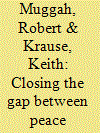

|
|
|
|
|
| Publication |
2009.
|
| Summary/Abstract |
This article highlights how the instruments for addressing the presumed source(s) of armed violence need to be sharpened and extended to address the heterogeneous character of armed violence present in many post-conflict situations. These extensions require the development of practical armed violence prevention and reduction programmes that draw upon scholarship and practice from the criminal justice and public health sectors. The article argues that reducing organized violence and insecurity in post-conflict contexts requires responding to the wider dynamics of armed violence rather than focusing exclusively on insecurity directly connected to what are traditionally defined as armed conflict and post-conflict dynamics; and this requires attention not just to the instruments of violence, but also to the political and economic motives of agents and institutions implicated in violent exchanges at all levels of social interaction.
|
|
|
|
|
|
|
|
|
|
|
|
|
|
|
|
| 2 |
ID:
072631
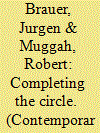

|
|
|
|
|
| Publication |
2006.
|
| Summary/Abstract |
This essay presents a theory of small arms demand and provides initial evidence from ongoing case studies in the Solomon Islands, Papua New Guinea, South Africa and Brazil. The theory revolves around the motivations and means to acquire arms, addressing issues such as contrasting acquirers and possessors and differentiating between acquirers and non-acquirers, consumers and producers, and final and intermediate demand. The essay also studies characteristics of small arms that make them so desirable as compared to other means of conducting violent conflict. The overall goal is to provide a theoretical framework and language that is common to a variety of social science approaches to the study of small arms use, misuse and abuse.
|
|
|
|
|
|
|
|
|
|
|
|
|
|
|
|
| 3 |
ID:
072635
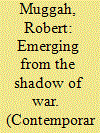

|
|
|
|
|
| Publication |
2006.
|
| Summary/Abstract |
Drawing on a wide range and multidisciplinary literature, this essay provides an overview of post-conflict armed violence. It then introduces a critical review of disarmament, demobilization and reintegration and weapons reduction activities - two comparatively new interventions championed by development donors ostensibly to reduce armed violence and secure the peace.
|
|
|
|
|
|
|
|
|
|
|
|
|
|
|
|
| 4 |
ID:
090441
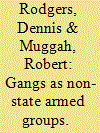

|
|
|
|
|
| Publication |
2009.
|
| Summary/Abstract |
Gangs are popularly considered to be the major security threat facing the Central American region. In focusing on the origins and dynamics of gangs in the region, this article seeks to broaden conceptualizations of non-state armed groups by expanding the theoretical optic from a narrow focus on war and post-war contexts to a wider spectrum of settings, actors, and motivations. It highlights a category of actors that does not explicitly seek to overthrow the state, but rather progressively undermines or assumes certain state functions. The article also reveals how efforts to contain and regulate gangs flow from their imputed motives, with interventions influenced by whether they are conceived as a criminal or political threat. At the same time, coercive regulation tend to be favoured even when such repressive interventions exacerbate gang violence, for reasons that reveal the deeper underlying political, social, and economic challenges facing the Central American region.
|
|
|
|
|
|
|
|
|
|
|
|
|
|
|
|
| 5 |
ID:
092056
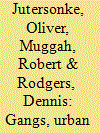

|
|
|
|
|
| Publication |
2009.
|
| Summary/Abstract |
Urban violence is a major preoccupation of policymakers, planners and development practitioners in cities around the world. Public authorities routinely seek to contain such violence through repression, as well as through its exportation to and containment at the periphery of metropolitan centres. Yet, urban violence is a highly heterogeneous phenomenon and not amenable to reified diagnosis and coercive intervention. Muscular state-led responses tend to overlook and conceal the underlying factors shaping the emergence of urban violence, as well as the motivations and means of so-called violence entrepreneurs. This is very obviously the case of urban gangs in Central America, which are regularly labelled a 'new urban insurgency' threatening the integrity of governments and public order. This article considers both the shape and character of Central American gang violence and attempts to reduce it, highlighting the complex relationship between these two phenomena. We advance a threefold approach to measuring the effectiveness of interventions, focusing in turn on discursive, practical and outcome-based criteria. In this way, the article demonstrates how, contrary to their reported success in diminishing gang violence, repressive first-generation approaches have tended instead to radicalize gangs, potentially pushing them towards more organized forms of criminality. Moreover, although credited with some modest successes, more preventive second-generation interventions seem to have yielded more rhetorical advances than meaningful reductions in gang violence.
|
|
|
|
|
|
|
|
|
|
|
|
|
|
|
|
| 6 |
ID:
074534
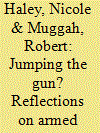

|
|
|
| 7 |
ID:
138408
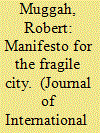

|
|
|
|
|
| Summary/Abstract |
After more than a century of steady city expansion in northern countries, the direction of twenty-first century population growth is shifting southwards. Over the next five decades, Africans, Arabs, and Asians will migrate in unprecedented numbers to cities, especially to their slums. Many of these urban settlements are insecure, disorganized, and violent. These are fragile cities and such migrations can threaten their inhabitants, countries, and the wider neighborhood. The analytical focus on fragile cities offers a novel scale when compared to fragile and failing states. It is also one that is preoccupying national policymakers, military strategists, and development experts. Drawing on theoretical and empirical contributions from geography, criminology, and sociology, this article identifies four mega-risks shaping urban fragility—the transformation and concentration of violence, turbo-urbanization, youth bulges, and the relentless penetration of new technologies. It also considers successful approaches to reversing city fragility, including twinning fragile cities with healthier and wealthier ones, investing in hotspot policing, interventions addressing at-risk youth, support for inclusive and cohesive urban growth, and the targeted application of new technologies.
|
|
|
|
|
|
|
|
|
|
|
|
|
|
|
|
| 8 |
ID:
061933
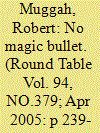

|
|
|
| 9 |
ID:
074308
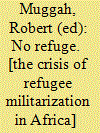

|
|
|
|
|
| Publication |
London, Zed Books, 2006.
|
| Description |
xviii, 261p.
|
| Standard Number |
1842777882
|
|
|
|
|
|
|
|
|
|
|
|
Copies: C:1/I:0,R:0,Q:0
Circulation
| Accession# | Call# | Current Location | Status | Policy | Location |
| 051816 | 355.02130869490967/MUG 051816 | Main | On Shelf | General | |
|
|
|
|
| 10 |
ID:
110513
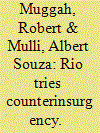

|
|
|
|
|
| Publication |
2012.
|
| Summary/Abstract |
"There are uncanny similarities between Rio de Janeiro's pacification strategy and ongoing counterinsurgency operations in Afghanistan and elsewhere."
|
|
|
|
|
|
|
|
|
|
|
|
|
|
|
|
|
|
|
|
|